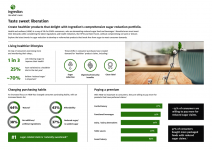Mothball factory reopened to satisfy sweetener demand
has been inactive since 2003 to increase production of the
sweetener aspartame, reports Philippa Nuttall.
The company said that the number of customers plumping for diet soft drinks had increased the demand for aspartame and prompted the decision to reopen the disused factory.
The reopening of the plant in Augusta, Georgia, will increase aspartame production by 30 percent, according to Craig Petray, NutraSweet's CEO.
He believes that demand for the sugar substitute is rising by 4 percent to 5 percent, with the global demand currently standing at about 16,000 tons.
"After we reopen our mothballed APM2 line at our aspartame plant in Augusta, we will once again have 10,000 tons of capacity, making us clearly the leader in the market today," Petray told FoodNavigatorUSA.com.
The factory should be ready for work "in the very near term", according to Petray.
Growth in the aspartame market has been driven recently by new roll-outs by soft drink giants Coca-Cola and PepsiCo.
Coca-Cola North America said last month that they will launch a new brand called Coca-Cola Zero sweetened with aspartame and acesulfame potassium, aimed at young adults who do not want "to compromise on taste" but who desire a drink with no calories.
The launch, set for June, followed swiftly on from the company's roll out of a new Coca-Cola sweetened with Tate & Lyle's sucralose sourced additive Splenda.
While the ingredients industry is bumping along today at around 3 to 4 per cent growth, suppliers of sweeteners are enjoying far stronger rates, 8.3 per cent year on year as rising health concerns drive consumers towards sugar free or low calorie products.
Market analysts Freedonia predict high single digit growth of intensity sweeteners will continue until 2008.
In a strong position to spear innovation, Coca Cola and arch competitor Pepsi have identified new sweetener based formulations to assure a hefty stake in this high growth market.
Diet soft drinks claim the biggest market share for artificial sweeteners, with over 87 million consumers in the US alone. According to a 1998 survey commissioned by the Calorie Control Council, 144 million American adults consume low-calorie, sugar-free products on a regular basis.
In pace with the competition PepsiCo also announced last month it would use Splenda sucralose in its reformulated Pepsi One cola to create a "full-flavour cola with only one calorie."
"We're increasing our focus on diet soft drinks this year, with the reformulation of Pepsi One as a major part of our efforts," said Katie Lacey, vice president of carbonated beverages at Pepsi-Cola North America.




















